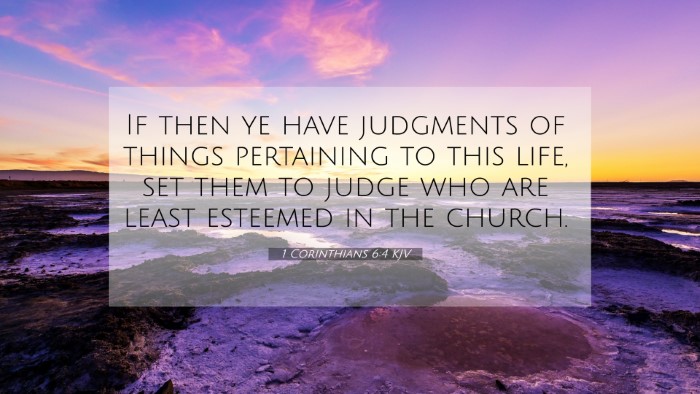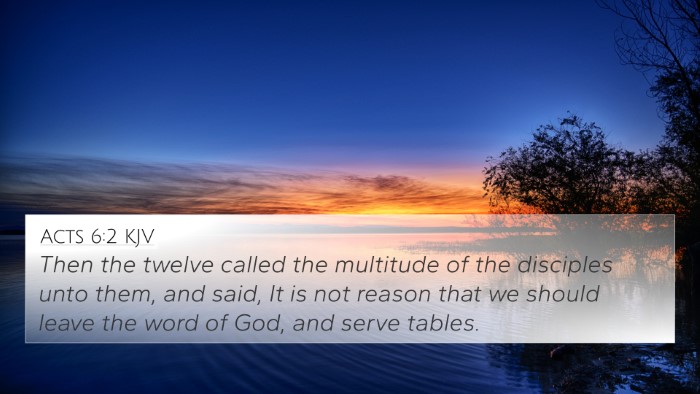Understanding 1 Corinthians 6:4
Verse: "If then you have judgments of things pertaining to this life, set them to judge who are least esteemed in the church."
Meaning and Interpretation
1 Corinthians 6:4 highlights the importance of a proper approach to resolving disputes among believers. The Apostle Paul urges the church at Corinth to seek judgment from individuals within the church community, even those considered least esteemed. This verse speaks to the authority and wisdom that believers possess, which should be used in their everyday dealings.
Summary of Insights
The insights drawn from various public domain commentaries provide a rich understanding of this verse:
-
Matthew Henry: Emphasizes that Christians should not seek judgment from secular authorities. Instead, they should utilize the wisdom available within their community, as doing so aligns their disputes with the principles of God’s kingdom.
-
Albert Barnes: Points out that Paul’s instruction reveals the inadequacy of the Corinthian church in addressing issues internally. He encourages believers to be mindful of their responsibilities and the abilities found among the church's members.
-
Adam Clarke: Notes the irony in seeking help from those seen as the least, which promotes humility and an understanding that God can use anyone, regardless of their status, to provide counsel and judgment in spiritual matters.
Bible Verse Cross-References
This verse connects with several others, highlighting themes of judgment, community, and wisdom:
- Matthew 18:15-17: Discusses how to resolve disputes among fellow believers.
- Proverbs 11:14: "Where there is no counsel, the people fall; but in the multitude of counselors, there is safety."
- James 1:5: "If any of you lacks wisdom, let him ask of God, who gives to all liberally."
- 1 Peter 4:10: Encourages believers to use their gifts to serve others, reinforcing the idea of community support.
- John 7:24: Jesus calls for righteous judgment, signaling that discernment is essential.
- Galatians 6:1: Instructs believers to restore those who have fallen gently, promoting mutual care within the church.
- 1 Corinthians 1:26-29: Paul reminds them that God often chooses the weak and foolish to confound the wise.
Thematic Connections
This verse occupies a significant position within inter-Biblical dialogue, revealing how different texts interact:
-
The call for community-based judgments reflects the spirit of community and ecclesiastical responsibility found throughout both the Old and New Testaments.
-
It ties into the Pauline theme present in his letters, particularly regarding church unity and the use of spiritual gifts for the edification of the body.
Applying Cross-Referencing Techniques
Using tools for Bible cross-referencing can help deepen one’s understanding of this verse. Exploring Bible concordance and Bible cross-reference guides enriches one’s study, unveiling connections that reveal broader biblical concepts.
Practical Applications
Believers are reminded to engage in cross-reference Bible study methods, fostering a community-oriented approach to resolving disputes and elevating the standards of judgment from the secular to the sacred.
Conclusion
1 Corinthians 6:4 serves as a crucial reminder for Christians to utilize the wisdom and insight of their community when faced with disputes. It encourages humility and the recognition that every member of the church, regardless of status, has valuable insights. By linking scripture with comfort and community, believers can navigate life’s challenges together, reinforcing the bonds of their faith.




